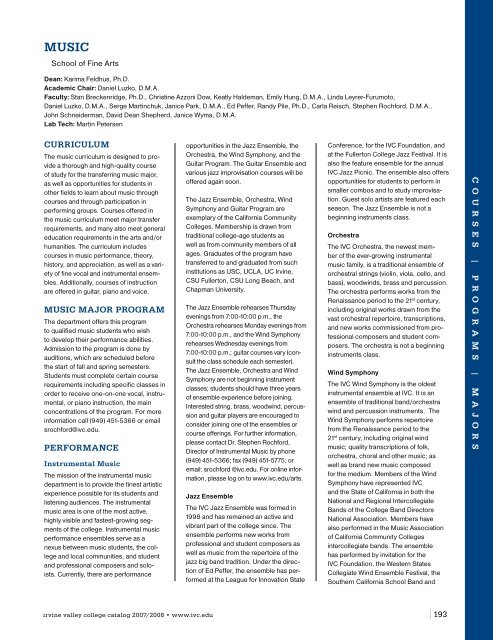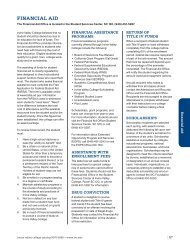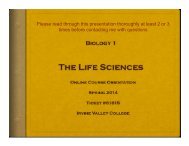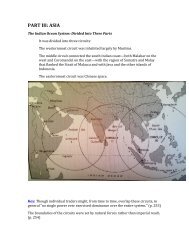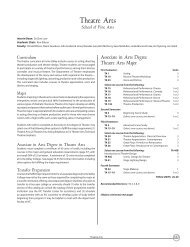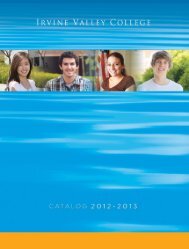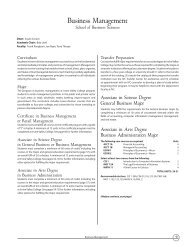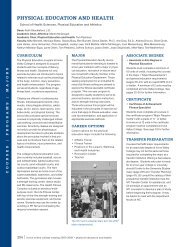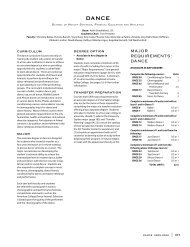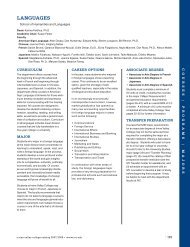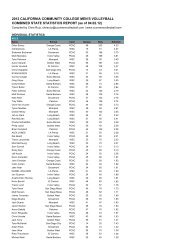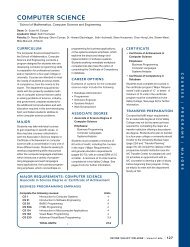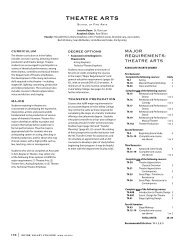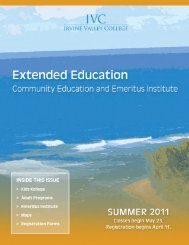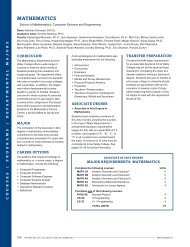mus - Irvine Valley College
mus - Irvine Valley College
mus - Irvine Valley College
Create successful ePaper yourself
Turn your PDF publications into a flip-book with our unique Google optimized e-Paper software.
Music<br />
School of Fine Arts<br />
Dean: Karima Feldhus, Ph.D.<br />
Academic Chair: Daniel Luzko, D.M.A.<br />
Faculty: Stan Breckenridge, Ph.D., Christine Azzoni Dow, Keatly Haldeman, Emily Hung, D.M.A., Linda Leyrer-Furumoto,<br />
Daniel Luzko, D.M.A., Serge Martinchuk, Janice Park, D.M.A., Ed Peffer, Randy Pile, Ph.D., Carla Reisch, Stephen Rochford, D.M.A.,<br />
John Schneiderman, David Dean Shepherd, Janice Wyma, D.M.A.<br />
Lab Tech: Martin Petersen<br />
CURRICULUM<br />
The <strong>mus</strong>ic curriculum is designed to provide<br />
a thorough and high-quality course<br />
of study for the transferring <strong>mus</strong>ic major,<br />
as well as opportunities for students in<br />
other fields to learn about <strong>mus</strong>ic through<br />
courses and through participation in<br />
performing groups. Courses offered in<br />
the <strong>mus</strong>ic curriculum meet major transfer<br />
requirements, and many also meet general<br />
education requirements in the arts and/or<br />
humanities. The curriculum includes<br />
courses in <strong>mus</strong>ic performance, theory,<br />
history, and appreciation, as well as a variety<br />
of fine vocal and instrumental ensembles.<br />
Additionally, courses of instruction<br />
are offered in guitar, piano and voice.<br />
MUSIC MAJOR PROGRAM<br />
The department offers this program<br />
to qualified <strong>mus</strong>ic students who wish<br />
to develop their performance abilities.<br />
Admission to the program is done by<br />
auditions, which are scheduled before<br />
the start of fall and spring semesters.<br />
Students <strong>mus</strong>t complete certain course<br />
requirements including specific classes in<br />
order to receive one-on-one vocal, instrumental,<br />
or piano instruction, the main<br />
concentrations of the program. For more<br />
information call (949) 451-5366 or email<br />
srochford@ivc.edu.<br />
Performance<br />
Instrumental Music<br />
The mission of the instrumental <strong>mus</strong>ic<br />
department is to provide the finest artistic<br />
experience possible for its students and<br />
listening audiences. The instrumental<br />
<strong>mus</strong>ic area is one of the most active,<br />
highly visible and fastest-growing segments<br />
of the college. Instrumental <strong>mus</strong>ic<br />
performance ensembles serve as a<br />
nexus between <strong>mus</strong>ic students, the college<br />
and local communities, and student<br />
and professional composers and soloists.<br />
Currently, there are performance<br />
opportunities in the Jazz Ensemble, the<br />
Orchestra, the Wind Symphony, and the<br />
Guitar Program. The Guitar Ensemble and<br />
various jazz improvisation courses will be<br />
offered again soon.<br />
The Jazz Ensemble, Orchestra, Wind<br />
Symphony and Guitar Program are<br />
exemplary of the California Community<br />
<strong>College</strong>s. Membership is drawn from<br />
traditional college-age students as<br />
well as from community members of all<br />
ages. Graduates of the program have<br />
transferred to and graduated from such<br />
institutions as USC, UCLA, UC <strong>Irvine</strong>,<br />
CSU Fullerton, CSU Long Beach, and<br />
Chapman University.<br />
The Jazz Ensemble rehearses Thursday<br />
evenings from 7:00-10:00 p.m., the<br />
Orchestra rehearses Monday evenings from<br />
7:00‐10:00 p.m., and the Wind Symphony<br />
rehearses Wednesday evenings from<br />
7:00-10:00 p.m.; guitar courses vary (consult<br />
the class schedule each semester).<br />
The Jazz Ensemble, Orchestra and Wind<br />
Symphony are not beginning instrument<br />
classes; students should have three years<br />
of ensemble experience before joining.<br />
Interested string, brass, woodwind, percussion<br />
and guitar players are encouraged to<br />
consider joining one of the ensembles or<br />
course offerings. For further information,<br />
please contact Dr. Stephen Rochford,<br />
Director of Instrumental Music by phone<br />
(949) 451‐5366; fax (949) 451-5775; or<br />
email: srochford @ivc.edu. For online information,<br />
please log on to www.ivc.edu/arts.<br />
Jazz Ensemble<br />
The IVC Jazz Ensemble was formed in<br />
1998 and has remained an active and<br />
vibrant part of the college since. The<br />
ensemble performs new works from<br />
professional and student composers as<br />
well as <strong>mus</strong>ic from the repertoire of the<br />
jazz big band tradition. Under the direction<br />
of Ed Peffer, the ensemble has performed<br />
at the League for Innovation State<br />
Conference, for the IVC Foundation, and<br />
at the Fullerton <strong>College</strong> Jazz Festival. It is<br />
also the feature ensemble for the annual<br />
IVC Jazz Picnic. The ensemble also offers<br />
opportunities for students to perform in<br />
smaller combos and to study improvisation.<br />
Guest solo artists are featured each<br />
season. The Jazz Ensemble is not a<br />
beginning instruments class.<br />
Orchestra<br />
The IVC Orchestra, the newest member<br />
of the ever-growing instrumental<br />
<strong>mus</strong>ic family, is a traditional ensemble of<br />
orchestral strings (violin, viola, cello, and<br />
bass), woodwinds, brass and percussion.<br />
The orchestra performs works from the<br />
Renaissance period to the 21 st century,<br />
including original works drawn from the<br />
vast orchestral repertoire, transcriptions,<br />
and new works commissioned from professional<br />
composers and student composers.<br />
The orchestra is not a beginning<br />
instruments class.<br />
Wind Symphony<br />
The IVC Wind Symphony is the oldest<br />
instrumental ensemble at IVC. It is an<br />
ensemble of traditional band/orchestra<br />
wind and percussion instruments. The<br />
Wind Symphony performs repertoire<br />
from the Renaissance period to the<br />
21 st century, including original wind<br />
<strong>mus</strong>ic; quality transcriptions of folk,<br />
orchestra, choral and other <strong>mus</strong>ic; as<br />
well as brand new <strong>mus</strong>ic composed<br />
for the medium. Members of the Wind<br />
Symphony have represented IVC<br />
and the State of California in both the<br />
National and Regional Intercollegiate<br />
Bands of the <strong>College</strong> Band Directors<br />
National Association. Members have<br />
also performed in the Music Association<br />
of California Community <strong>College</strong>s<br />
intercollegiate bands. The ensemble<br />
has performed by invitation for the<br />
IVC Foundation, the Western States<br />
Collegiate Wind Ensemble Festival, the<br />
Southern California School Band and<br />
C O U R S E S | P R O G R A M S | M A J O R S<br />
irvine valley college catalog 2007/2008 • www.ivc.edu | 193
C O U R S E S | P R O G R A M S | M A J O R S<br />
Orchestra Association Conferences, the<br />
CSU Los Angeles Community <strong>College</strong><br />
Festival, and the State Conference<br />
of the Music Association of California<br />
Community <strong>College</strong>s. Since 1991 the<br />
ensemble has performed over thirty<br />
world, state, or regional premieres of<br />
new <strong>mus</strong>ic, including over 10 works commissioned<br />
directly from professional<br />
composers and from IVC composition<br />
students. The Wind Symphony is not a<br />
beginning instruments class.<br />
Guitar Program<br />
Under the direction of world-renowned<br />
guitarist and lutenist John Schneiderman,<br />
the guitar program offers recital opportunities<br />
for students to perform as soloists<br />
and in small and large ensembles. It is<br />
the fastest-growing segment of the instrumental<br />
<strong>mus</strong>ic area.<br />
Piano Performance<br />
The department offers a vibrant program<br />
with outstanding piano faculty and a busy<br />
calendar of concerts, master classes and<br />
other activities. The recently renovated<br />
stock of acoustic and electronic instruments<br />
with the Kawai piano program<br />
offers students high-quality instruments<br />
for performance and practice, including<br />
a 9-foot concert grand piano for recitals<br />
and master classes. Each year the<br />
department proudly offers a piano series<br />
with faculty and internationally renowned<br />
guest pianists, among them such artists<br />
as Misha Dacic, Andrzej Dutkiewicz,<br />
and John Que. IVC piano students have<br />
successfully transferred to major fouryear<br />
universities and colleges including<br />
Chapman, CSU Fullerton, and UC<br />
Berkeley. For further information, contact<br />
Dr. Daniel Luzko at dluzko@ivc.edu.<br />
Choral Performance<br />
<strong>Irvine</strong> Masterworks Chorale<br />
The <strong>Irvine</strong> Masterworks Chorale, which<br />
just celebrated its 25 th anniversary season,<br />
has enjoyed an exciting journey<br />
since its inception with the opening of<br />
the college in 1979. The Masterworks<br />
Chorale performs a diverse repertoire of<br />
<strong>mus</strong>ic, including major works with orchestra.<br />
The repertoire includes <strong>mus</strong>ic from a<br />
variety of <strong>mus</strong>ical styles, reflective of multiple<br />
periods of <strong>mus</strong>ic history and various<br />
<strong>mus</strong>ical cultures throughout the world,<br />
including Africa, Japan, India, China, and<br />
Latin America.<br />
Masterworks Chorale members have<br />
performed three times in Carnegie<br />
Hall in New York and have traveled in<br />
European tours to Germany, Austria, and<br />
Switzerland. Their most recent international<br />
concert tour was to South America,<br />
where they performed in Argentina,<br />
Paraguay and Brazil. Masterworks<br />
Chorale members have been selected<br />
regularly for honor choirs at both<br />
the Western Regional and National<br />
Conferences of the American Choral<br />
Directors Association. Masterworks<br />
Chorale participates in several invitational<br />
choral festivals each year in addition to its<br />
regular concert season.<br />
For further information about these<br />
groups or to audition, please contact<br />
Carol Danna at (949) 451-5453, or email<br />
David Dean Shepherd, dshepherd@ivc.<br />
edu. Rehearsals are held on Tuesday<br />
evenings from 7:00-10:00 p.m. on the<br />
college campus, in Room A 311.<br />
Music Lessons<br />
The Music Department recognizes that,<br />
for many students, learning how to play<br />
an instrument or sing can be a source of<br />
great enrichment in their college education.<br />
Class lessons in guitar, piano and<br />
voice are offered by expert teachers—<br />
performers of the highest caliber who can<br />
be seen and heard in professional venues<br />
around Southern California.<br />
Not only do students learn the rudiments<br />
of performance; they are able to<br />
proceed from beginning to intermediate<br />
and advanced levels of instruction. Class<br />
instruction in performance has proven<br />
educational benefits, enhancing learning<br />
as well as providing peer support and<br />
motivation. An additional benefit is that<br />
class lessons are economical for IVC<br />
students.<br />
Music History<br />
The Department of Music offers general<br />
education breadth courses in <strong>mus</strong>ic<br />
history. These courses are appropriate<br />
as part of a student’s general education<br />
transfer preparation or as part of a<br />
student’s interest in learning more about<br />
the diverse disciplines of the arts. Music<br />
Appreciation (Music 20) is the standard<br />
collegiate lower division course covering<br />
<strong>mus</strong>ical style and genre, as well as<br />
historical and biographical information<br />
about the many European classical <strong>mus</strong>ic<br />
traditions. World Music (Music 21) covers<br />
<strong>mus</strong>ical style and genre, and historical<br />
and sociological aspects of <strong>mus</strong>ic from<br />
non-European sources. History of Jazz<br />
(Music 27) and History of Rock Music<br />
(Music 28), one of the most popular<br />
courses in the program, cover <strong>mus</strong>ical<br />
style and genre, as well as historical, biographical,<br />
and political aspects of these<br />
most important contemporary art forms.<br />
All of these courses are transferable to<br />
both the UC and CSU systems.<br />
Career options<br />
Examples of careers for the <strong>mus</strong>ic major<br />
include the following:<br />
• Accompanist<br />
• Agent<br />
• Arranger<br />
• Arts Attorney<br />
• Arts Journalist/Reviewer<br />
• Arts Management<br />
• Arts Marketing and Sales<br />
• Composer<br />
• Conductor<br />
• Contract Attorney<br />
• Copyist<br />
• Curator (Arts, Instruments and<br />
Manuscripts)<br />
• Editor<br />
• Foley Artist<br />
• Instrument Designer and Builder<br />
• Instrument Manufacturer<br />
• Instrument Repair<br />
• Intellectual Property Rights Attorney<br />
• Music Consultant<br />
• Music Librarian<br />
• Music Psychology<br />
• Music Store Owner<br />
• Music Theoretician<br />
• Music Therapy<br />
• Musicologist<br />
• Organ Builder/Tuner/Technician<br />
• Part Preparer<br />
• Performer<br />
• Piano Technician<br />
• Piano Tuner<br />
• Producer<br />
• Proofreader<br />
• Publisher<br />
• Sound and Stage Technician<br />
• Sound Designer<br />
• Sound Engineer<br />
• Teacher<br />
• Web Sound Designer<br />
194 | irvine valley college catalog 2007/2008 • <strong>mus</strong>ic
associate DEGREE<br />
• Associate in Arts Degree in Music<br />
Students <strong>mus</strong>t complete a minimum of<br />
60 units of credit, including the courses<br />
in the major (“Major Requirements”)<br />
and general education requirements<br />
(pages 36-43), with an overall GPA of 2.0<br />
or better. A minimum of 12 units <strong>mus</strong>t be<br />
completed at <strong>Irvine</strong> <strong>Valley</strong> <strong>College</strong>. See<br />
pages 32-35 for further information.<br />
Major Requirements: Music<br />
Associate in Arts Degree<br />
Complete the following courses:<br />
Transfer Preparation<br />
Courses that fulfill major requirements<br />
for an associate degree at <strong>Irvine</strong> <strong>Valley</strong><br />
<strong>College</strong> may not be the same as those<br />
required for completing the major at a<br />
transfer institution offering a baccalaureate<br />
degree. Students who plan to transfer<br />
to a four-year college or university<br />
should (1) refer to the University Studies<br />
major (page 231) and “Transfer Planning”<br />
(page 47); (2) consult the catalog of their<br />
prospective transfer institution (see the<br />
IVC Transfer Center for assistance); and<br />
(3) schedule an appointment with an<br />
IVC counselor to develop a plan of study<br />
before beginning their program. It may<br />
be helpful to meet with the department<br />
faculty at IVC.<br />
Units<br />
First Semester<br />
MUS 3 Harmony I 5<br />
MUS 34-39, 40-47 One of the performance groups 2<br />
MUS 50, 51 or 52 Applied Music: Instrumental, Keyboard or Voice 0.5<br />
MUS 54 Beginning Piano (or proficiency exam) 2<br />
MUS 53 Concert Music 0.5<br />
MUS 180 Music Laboratory 0.5<br />
Second Semester<br />
MUS 4 Harmony II 5<br />
MUS 34-39, 40-47 One of the performance groups 2<br />
MUS 50, 51 or 52 Applied Music: Instrumental, Keyboard or Voice 0.5<br />
MUS 55 Intermediate Piano (or proficiency exam) 2<br />
MUS 53 Concert Music 0.5<br />
MUS 180 Music Laboratory 0.5<br />
Third Semester<br />
MUS 5 Harmony III 5<br />
MUS 34-39, 40-47 One of the performance groups 2<br />
MUS 50, 51 or 52 Applied Music: Instrumental, Keyboard or Voice 0.5<br />
MUS 56 Advanced Piano (or proficiency exam) 2<br />
MUS 53 Concert Music 0.5<br />
MUS 180 Music Laboratory 0.5<br />
Courses<br />
MUSIC ComposiTION<br />
AND TheORY<br />
MUS 1: The Basics of Music<br />
3 Units<br />
3 hours lecture<br />
Transfers: CSU, UC<br />
This course is a study of the basic principles<br />
and structures of <strong>mus</strong>ic including<br />
rhythm and pitch notation, counting,<br />
scales, key signatures, intervals, and<br />
triads. Students develop basic skills in<br />
<strong>mus</strong>ic reading, sightsinging, aural dictation,<br />
and notation. Attendance at live concerts<br />
may be required. NR<br />
MUS 3: Harmony I<br />
5 Units<br />
5 hours lecture<br />
Transfers: CSU, UC<br />
Recommended Preparation: Mus. 1<br />
This course involves an intensive study<br />
of diatonic harmony in major and minor<br />
modes, harmonization of the given melody,<br />
triads, seventh chords, the cadential<br />
six-four chord, harmonic progression, and<br />
cadences. The student will study the writing,<br />
singing, and recognition of diatonic<br />
melodies and harmonies. Sight-singing,<br />
rhythmic recognition, and dictation as well<br />
as keyboard harmony will be included. NR<br />
MUS 4: Harmony II<br />
5 Units<br />
5 hours lecture<br />
Transfers: CSU, UC<br />
Prerequisite: Mus. 3<br />
Recommended Preparation: Mus. 1<br />
This course involves an extension of the<br />
intensive study of diatonic harmony in<br />
major and minor modes including nonchord<br />
tones, treatment of seventh chords,<br />
and modulation to closely related keys.<br />
The student will study the writing, singing,<br />
and recognition of diatonic melodies and<br />
harmonies. Sight-singing, rhythmic recognition,<br />
and dictation as well as keyboard<br />
harmony will be included. NR<br />
C O U R S E S | P R O G R A M S | M A J O R S<br />
Fourth Semester<br />
MUS 6 Harmony IV 5<br />
MUS 34-39, 40-47 One of the performance groups 2<br />
MUS 50, 51 or 52 Applied Music: Instrumental, Keyboard or Voice 0.5<br />
MUS 56 Advanced Piano (or proficiency exam) 2<br />
MUS 53 Concert Music 0.5<br />
MUS 180 Music Laboratory 0.5<br />
TOTAL UNITS: 34–42<br />
irvine valley college catalog 2007/2008 • www.ivc.edu | 195
C O U R S E S | P R O G R A M S | M A J O R S<br />
MUS 5: Harmony III<br />
5 Units<br />
5 hours lecture<br />
Transfers: CSU, UC<br />
Recommended Preparation: Mus. 4<br />
This course studies chromatic harmony<br />
elements (secondary functions, modulatory<br />
techniques, mode mixture, Neapolitan<br />
chords, augmented sixth chords, and<br />
enharmonic spellings). Students will study<br />
the application of these chromatic harmony<br />
elements in <strong>mus</strong>ical masterworks of<br />
the second half of the nineteenth century;<br />
analyze the usage of chromatic chords,<br />
their preparation and resolution; and create<br />
examples of chromatic writing. The<br />
course will include sight-singing and dictation<br />
of chromatic melodies; harmonic<br />
dictation in two-, three-, and four-part textures;<br />
rhythmic dictation; and keyboard<br />
harmony. This course is required for all<br />
<strong>mus</strong>ic majors. NR<br />
MUS 6: Harmony IV<br />
5 Units<br />
5 hours lecture<br />
Transfers: CSU, UC<br />
Recommended Preparation: Mus. 5<br />
This course studies harmony of the twentieth<br />
and twenty-first centuries focusing on<br />
the different techniques including ninth,<br />
eleventh, and thirteen chords; altered<br />
harmony; secundal and quartal harmony;<br />
polychord construction; twelve-tone<br />
system; minimalism; chance <strong>mus</strong>ic; and<br />
sound mass. Students are required to<br />
compose short <strong>mus</strong>ical fragments and<br />
complete presentations on twentieth century<br />
composers and their <strong>mus</strong>ic and/or<br />
compose pieces of <strong>mus</strong>ic involving one or<br />
more of these techniques. NR<br />
MUSIC APPRECIATION<br />
AND HISTORY<br />
MUS 20: Music Appreciation<br />
3 Units<br />
3 hours lecture<br />
Transfers: CSU, UC<br />
This course introduces skills for listening<br />
to <strong>mus</strong>ic, with an emphasis on the various<br />
Euro-Western classical <strong>mus</strong>ic traditions.<br />
Students will learn to identify components<br />
of <strong>mus</strong>ic such as meter, tempo, dynamics,<br />
texture, orchestration, and style characteristics.<br />
Students will also learn biographical<br />
information regarding significant<br />
composers, as well as the cultural, social,<br />
religious, and political contexts in which<br />
these traditions have existed and continue<br />
to exist. Students will also be provided<br />
with guidance in selecting concerts and<br />
recordings of the various <strong>mus</strong>ic traditions<br />
learned in the course. Attendance at live<br />
concerts is required. NR<br />
MUS 21: World Music<br />
3 Units<br />
3 hours lecture<br />
Transfers: CSU, UC<br />
This course introduces skills for listening<br />
to <strong>mus</strong>ic within both Western and<br />
non-Western <strong>mus</strong>ical traditions. Students<br />
study vocal and instrumental traditions,<br />
as well as <strong>mus</strong>ical components such as<br />
tempo, dynamics, texture, orchestration,<br />
form, and style characteristics. Students<br />
also consider historical, cultural, socioeconomic,<br />
religious, and/or political<br />
contexts and issues that bear upon the<br />
<strong>mus</strong>ic. Attendance at live concerts may be<br />
required. NR<br />
MUS 27: History of Jazz<br />
3 Units<br />
3 hours lecture<br />
Transfers: CSU, UC<br />
This course studies the development of<br />
<strong>mus</strong>ical styles, players, genres and forms<br />
of jazz. Emphasis is on styles, genres,<br />
forms, composers, and geographical<br />
centers of activity associated with jazz.<br />
Supplementary historical and biographical<br />
information will assist in placing the <strong>mus</strong>ic<br />
within the context of Western cultural and<br />
intellectual history. NR<br />
MUS 28: History of Rock Music<br />
3 Units<br />
3 hours lecture<br />
Transfers: CSU, UC<br />
This course traces the development and<br />
history of rock <strong>mus</strong>ic from the U.S. Civil<br />
War to the present. Students study <strong>mus</strong>ical,<br />
sociological and political aspects of rock<br />
<strong>mus</strong>ic as well as important people, ensembles,<br />
and institutions of the genre. The<br />
course includes a general study of <strong>mus</strong>ical<br />
elements such as melody, harmony, rhythm<br />
and orchestration as they pertain to the<br />
diverse styles of rock <strong>mus</strong>ic. Attendance at<br />
live concerts may be required. NR<br />
MUSIC<br />
(CHORAL PERFORMANCE)<br />
MUS 34: <strong>Irvine</strong> <strong>Valley</strong> <strong>College</strong><br />
Singers<br />
2 Units<br />
.5 hour lecture, 5.5 hours lab<br />
Transfers: CSU, UC<br />
Limitation: By audition only<br />
Recommended Preparation: Mus. 1<br />
The focus of the <strong>Irvine</strong> <strong>Valley</strong> <strong>College</strong><br />
Singers is on the rehearsal and performance<br />
of standard choral literature and<br />
world <strong>mus</strong>ic, including chant, traditional<br />
polyphonic and folk styles, in many languages.<br />
Students practice vocal techniques<br />
and ensemble singing. IVC Singers<br />
is open to all students by audition. Public<br />
performance is required for credit. R-E-3<br />
MUS 37: Women’s Chorus<br />
2 Units<br />
.5 hour lecture, 5.5 hours lab<br />
Transfers: CSU, UC<br />
Recommended Preparation: Mus. 1<br />
Limitation: By audition only<br />
The Women’s Chorus (“Oriana Choir”)<br />
focuses on the rehearsal and performance<br />
of choral <strong>mus</strong>ic for women’s voices from<br />
the sixteenth century to the present.<br />
Students practice vocal technique and<br />
ensemble singing. Public performance is<br />
required for credit. R-E-3<br />
MUS 38: <strong>Irvine</strong> Singers<br />
2 Units<br />
.5 hour lecture, 5.5 hours lab<br />
Transfers: CSU, UC<br />
Limitation: By audition only<br />
Recommended Preparation: Mus. 1,<br />
Mus. 39 or Mus. 80<br />
The <strong>Irvine</strong> Singers ensemble focuses on<br />
the study and performance of repertoire<br />
for chamber choir, both a cappella and<br />
with instrumental accompaniment. The<br />
ensemble performs concerts of choral repertoire<br />
for the smaller ensemble, from early<br />
polyphony to new <strong>mus</strong>ic by living composers.<br />
Entrance is by audition, and public<br />
performance is required for credit. R-E-3<br />
MUS 39: <strong>Irvine</strong> Masterworks<br />
Chorale<br />
2 Units<br />
.5 hour lecture, 5.5 hours lab<br />
Transfers: CSU, UC<br />
Limitation: By audition only<br />
Recommended Preparation: Mus. 1<br />
The Masterworks Chorale gives public<br />
concerts, often with orchestral accompaniment.<br />
The group offers singers a variety<br />
of experiences, including the opportunity<br />
to perform major works of the great composers,<br />
multicultural repertoire and new<br />
works. The focus of the repertoire varies<br />
each time the course is offered. Public<br />
performance is required for credit. R-E-3<br />
196 | irvine valley college catalog 2007/2008 • <strong>mus</strong>ic
MUSIC<br />
(INSTRUMENTAL<br />
PERFORMANCE)<br />
MUS 40: Wind Ensemble<br />
2 Units<br />
1 hour lecture, 3 hours lab<br />
Transfers: CSU, UC<br />
Limitation: Students <strong>mus</strong>t have previous<br />
orchestral wind or percussion instrument<br />
training. Not a beginning instruments<br />
course.<br />
The Wind Ensemble performs wind<br />
and percussion literature from the<br />
Renaissance, Baroque, Classical, and<br />
Romantic periods, as well as twentieth<br />
century and contemporary works.<br />
Instrumentation will vary according to the<br />
demands of the literature. The emphasis<br />
is on a high degree of individual <strong>mus</strong>icianship<br />
and ensemble performance. The<br />
focus of the repertoire varies each time<br />
the course is offered. Participation in formal<br />
concerts, both on and off campus, is<br />
required. R-E-3<br />
MUS 41: Symphonic Wind<br />
Ensemble<br />
2 Units<br />
1 hour lecture, 3 hours lab<br />
Transfers: CSU, UC<br />
Limitation: Students <strong>mus</strong>t have previous<br />
instrument training. Not a beginning instruments<br />
course.<br />
The Symphonic Wind Ensemble, a wind and<br />
percussion symphony, performs traditional<br />
and contemporary literature, including newly<br />
commissioned works. The emphasis is on<br />
a high degree of individual <strong>mus</strong>icianship<br />
and ensemble performance. The focus of<br />
the repertoire varies each time the course<br />
is offered. Participation in formal concerts,<br />
both on and off campus, is required. R-E-3<br />
MUS 42: Symphony Orchestra<br />
2 Units<br />
1 hour lecture, 3 hours lab<br />
Limitation: Students <strong>mus</strong>t have previous<br />
orchestral instrument training. Not a<br />
beginning instruments course.<br />
The Symphony Orchestra performs<br />
traditional and contemporary literature,<br />
including newly commissioned works. The<br />
emphasis is on a high degree of individual<br />
<strong>mus</strong>icianship and ensemble performance.<br />
The focus of the repertoire varies each<br />
time the course is offered. Participation in<br />
formal concerts, both on and off campus,<br />
is required. R-E-3<br />
MUS 43: Performance Ensemble:<br />
String Orchestra<br />
2 Units<br />
1 hour lecture, 3 hours lab<br />
Transfers: CSU, UC<br />
Limitation: Students <strong>mus</strong>t have previous<br />
instrumental training and ensemble<br />
experience.<br />
The String Orchestra performs traditional<br />
and contemporary literature, including<br />
newly commissioned works. The emphasis<br />
is on a high degree of individual <strong>mus</strong>icianship<br />
and ensemble performance. The<br />
focus of the repertoire varies each time<br />
the course is offered. Participation in formal<br />
concerts, both on and off campus, is<br />
required. R-E-3<br />
MUS 46: Jazz Ensemble<br />
2 Units<br />
1 hour lecture, 3 hours lab<br />
Limitation: Students <strong>mus</strong>t have previous<br />
jazz ensemble wind, keyboard or rhythm<br />
section training. Not a beginning instruments<br />
course.<br />
The Jazz Ensemble focuses on the<br />
rehearsal and performance of standard<br />
jazz literature for big band ensembles,<br />
ranging from swing to contemporary<br />
genres. The focus of the repertoire varies<br />
each time the course is offered.<br />
Participation in formal concerts, both on<br />
and off campus, is required. R-E-3<br />
MUS 47: IVC Big Band<br />
2 Units<br />
1 hour lecture, 3 hours lab<br />
Transfers: CSU, UC<br />
Limitation: Students <strong>mus</strong>t have previous<br />
instrumental training and ensemble experience.<br />
Not a beginning instruments course.<br />
The IVC Big Band performs traditional and<br />
contemporary literature, including newly<br />
commissioned works, for a traditional jazz<br />
“big band.” The emphasis is on a high<br />
degree of individual <strong>mus</strong>icianship and<br />
ensemble performance. The focus of the<br />
repertoire varies each time the course is<br />
offered. Participation in formal concerts,<br />
both on and off campus, is required. R-E-3<br />
MUS 70: Beginning Jazz<br />
Improvisation<br />
2 Units<br />
1.5 hours lecture, 1.5 hours lab<br />
Transfers: CSU, UC<br />
Recommended Preparation: Music<br />
theory (Mus. 1), chord construction<br />
and previous instrumental or vocal<br />
experience/training.<br />
This course introduces basic techniques<br />
of jazz improvisation, including scales and<br />
chord constructions, with applications<br />
toward performance. This is not a beginning<br />
instruments class. R-E-3<br />
MUS 71: Intermediate Jazz<br />
Improvisation<br />
2 Units<br />
1.5 hours lecture, 1.5 hours lab<br />
Transfers: CSU, UC<br />
Recommended Preparation: Music<br />
theory (Mus. 1), chord construction,<br />
and previous instrumental or vocal<br />
experience/training.<br />
This course covers techniques of jazz<br />
improvisation at the intermediate level,<br />
including scales and chord constructions,<br />
with applications toward performance. This<br />
is not a beginning instruments class. Public<br />
performance may be required. R-E-3<br />
MUS 72: Advanced Jazz<br />
Improvisation<br />
2 Units<br />
1.5 hours lecture, 1.5 hours lab<br />
Transfers: CSU, UC<br />
Recommended Preparation: Music<br />
theory (Mus. 1), chord construction,<br />
and previous instrumental or vocal<br />
experience/training.<br />
This covers advanced techniques of jazz<br />
improvisation, including scales and chord<br />
constructions, with applications toward<br />
performance. This is not a beginning<br />
instruments class. Public performance<br />
may be required. R-E-3<br />
MUSIC (APPLIED MUSIC)<br />
MUS 50: Applied Music:<br />
Instrumental<br />
.5 Unit<br />
1 hour lab<br />
Transfers: CSU, UC<br />
Limitation: By audition only<br />
Corequisite: Mus. 53<br />
This course provides one half-hour individual<br />
lesson per week in a traditional band<br />
or orchestral instrument or classical guitar<br />
with an instructor on the Applied Music<br />
faculty. A performance for a faculty jury is<br />
required at the end of the semester. The<br />
course is designed for the <strong>mus</strong>ic major<br />
whose performance ability is at a college<br />
level. R-E-3<br />
C O U R S E S | P R O G R A M S | M A J O R S<br />
irvine valley college catalog 2007/2008 • www.ivc.edu | 197
C O U R S E S | P R O G R A M S | M A J O R S<br />
MUS 51: Applied Music: Keyboard<br />
.5 Unit<br />
1 hour lab<br />
Transfers: CSU, UC<br />
Limitation: By audition only<br />
Corequisite: Mus. 53<br />
This course provides one half-hour individual<br />
keyboard lesson per week with an<br />
instructor on the Applied Music faculty.<br />
Performances for a faculty jury will be<br />
required at the end of the semester. The<br />
course is designed for the <strong>mus</strong>ic major<br />
whose performance ability is at a college<br />
level. R-E-3<br />
MUS 52: Applied Music: Voice<br />
.5 Units<br />
1 hour lab<br />
Transfers: CSU, UC<br />
Limitation: By audition only<br />
Corequisite: Mus. 53<br />
This course provides one half-hour individual<br />
voice lesson per week with an<br />
instructor on the Applied Music faculty.<br />
Performances for a faculty jury will be<br />
required at the end of the semester. The<br />
course is designed for the <strong>mus</strong>ic major<br />
whose performance ability is at a college<br />
level. R-E-3<br />
MUS 53: Concert Music<br />
.5 Unit<br />
1.5 hours lab<br />
Transfers: CSU, UC<br />
Music 53 is required of all <strong>mus</strong>ic majors;<br />
however, it is open to all students.<br />
Students participate in and attend concerts,<br />
recitals, and master classes; organize<br />
and prepare programs; and assist in<br />
all aspects of pre-and post-performance<br />
production. R-E-3<br />
MUSIC LESSONS<br />
(INSTRUMENTAL)<br />
MUS 54: Beginning Piano<br />
2 Units<br />
1.5 hours lecture, 1.5 hours lab<br />
Transfers: CSU, UC<br />
Music 54 introduces basic interpretive,<br />
technical, and expressive skills for playing<br />
the piano. Students learn the foundations<br />
of keyboard <strong>mus</strong>icianship, including standard<br />
<strong>mus</strong>ic notation; pentascales; scales;<br />
and tonic, subdominant and dominant<br />
harmonies. They also learn to develop<br />
technical facility and critical listening<br />
skills. Attendance at live concerts may be<br />
required. R-E-3<br />
MUS 55: Intermediate Piano<br />
2 Units<br />
1.5 hours lecture, 1.5 hours lab<br />
Transfers: CSU, UC<br />
Recommended Preparation: Mus. 54<br />
Music 55 emphasizes repertoire, technique<br />
and performance style. The course<br />
promotes the interpretation of intermediate-level<br />
compositions of the classical<br />
<strong>mus</strong>ic masters, as well as popular repertoire.<br />
The course relies on aspects of<br />
piano technique, such as major and minor<br />
scales and arpeggios in three octaves,<br />
tone production, and sight-reading.<br />
Attendance at concerts may be required.<br />
R-E-3<br />
MUS 56: Advanced Piano<br />
2 Units<br />
1.5 hours lecture, 1.5 hours lab<br />
Transfers: CSU, UC<br />
Recommended Preparation: Mus. 55<br />
Music 56 gives students the opportunity<br />
to study and perform piano literature at an<br />
advanced level. Students work on style,<br />
interpretation, technique, harmonization,<br />
and improvisation, participating in<br />
both individual and group assignments.<br />
Attendance at live concerts may be<br />
required. R-E-3<br />
MUS 83: Beginning Classical<br />
Guitar<br />
2 Units<br />
1.5 hours lecture, 1.5 hours lab<br />
Transfers: CSU, UC<br />
This is a course emphasizing beginning<br />
classical guitar techniques and repertoire.<br />
Topics include playing position, tuning,<br />
free and rest strokes, alternation, naming<br />
of fingers, chords, and arpeggios. The<br />
student is introduced to <strong>mus</strong>ical notation,<br />
time and counting, notes on the open<br />
strings, and notes on the frets. In the study<br />
of the first position, the student is exposed<br />
to sharps, flats, natural signs, and key signatures.<br />
Students will develop proficiency<br />
in playing simple two-part Spanish pieces.<br />
The course is designed for beginning<br />
guitarists and/or guitarists with no <strong>mus</strong>ic<br />
reading background. Field trips may be<br />
required. R-E-3<br />
MUS 84: Intermediate Classical<br />
Guitar<br />
2 Units<br />
1.5 hours lecture, 1.5 hours lab<br />
Transfers: CSU, UC<br />
Recommended Preparation: Mus. 83<br />
This is a course emphasizing intermediate<br />
classical guitar techniques and repertoire.<br />
Topics include chords, <strong>mus</strong>ic in two lines,<br />
ligado techniques, dotted notes, dynamic<br />
markings, and tempo indications. The<br />
student will learn Renaissance, baroque,<br />
classical, romantic, and modern pieces<br />
in the first and second positions, along<br />
with single-line exercises in the third and<br />
fifth positions. This course is designed for<br />
intermediate guitarists with some <strong>mus</strong>ic<br />
reading background. Field trips may be<br />
required. R-E-3<br />
MUS 85: Advanced Classical<br />
Guitar<br />
2 Units<br />
1.5 hours lecture, 1.5 hours lab<br />
Transfers: CSU, UC<br />
Recommended Preparation: Mus. 84<br />
This is a course emphasizing advanced<br />
classical guitar techniques, repertoire,<br />
and interpretation. Topics include reading<br />
in the higher positions, contrapuntal<br />
<strong>mus</strong>ic, harmonics, and ornamentation.<br />
The student will learn Renaissance,<br />
baroque, classical, romantic, and modern<br />
pieces in all positions and be exposed to<br />
performance practices for all style periods.<br />
The course is designed for advanced<br />
guitarists with a strong <strong>mus</strong>ic reading<br />
background. Field trips may be required.<br />
R-E-3<br />
MUSIC LESSONS (VOCAL)<br />
MUS 80: Beginning Voice<br />
2 Units<br />
1.5 hours lecture, 1.5 hours lab<br />
Transfers: CSU, UC<br />
Recommended Preparation: Mus. 1<br />
This course is designed to provide students<br />
with vocal training and introduce<br />
them to vocal literature from a variety of<br />
cultures and genres, including art songs,<br />
folk songs, and songs of the <strong>mus</strong>ical<br />
theatre. The goal is to train students<br />
to use the unamplified voice to its best<br />
advantage, to interpret and perform songs<br />
suited to their individual ability, and to read<br />
their vocal parts. Concert attendance may<br />
be required. R-E-3<br />
198 | irvine valley college catalog 2007/2008 • <strong>mus</strong>ic
MUS 81: Intermediate Voice<br />
2 Units<br />
1.5 hours lecture, 1.5 hours lab<br />
Transfers: CSU, UC<br />
Recommended Preparation: Mus. 1<br />
This course exposes students to an intermediate<br />
level of vocal training and vocal<br />
literature. The course provides training<br />
in the International Phonetic Alphabet to<br />
assist singers with pronunciation in Italian<br />
and other Romance languages as well<br />
as English. Singers practice using the<br />
unamplified voice to interpret and perform<br />
English and Italian art songs and <strong>mus</strong>ical<br />
theatre repertoire suited to their ability.<br />
The course stresses the importance of<br />
understanding the mechanism of the voice<br />
and how to care for it. Concert attendance<br />
may be required. R-E-3<br />
MUS 82: Vocal Performance<br />
Workshop<br />
2 Units<br />
1.5 hours lecture, 1.5 hours lab<br />
Transfers: CSU, UC<br />
This course is designed to give singers<br />
regular opportunities to perform in class<br />
and in public. Students will evaluate their<br />
own singing technique and receive written<br />
and verbal feedback from each other<br />
and the instructor. Throughout the course,<br />
students will concentrate on applying their<br />
knowledge of diction, breath support, care<br />
of the voice, and expression. The focus of<br />
the repertoire varies each time the course<br />
is offered. Attendance at concerts may be<br />
required. R-E-3<br />
MUSIC (LAB)<br />
MUS 180: Music Laboratory<br />
.5 Unit<br />
1.5 hours learning center<br />
Transfers: CSU<br />
This course is designed to facilitate students’<br />
learning of specific skills in the<br />
performing arts. The Music Laboratory<br />
is mandatory for <strong>mus</strong>ic major students<br />
and recommended for all students taking<br />
performing arts classes. Students<br />
are required to complete 24 hours during<br />
a semester. This course is open-entry/<br />
open-exit and is graded on a credit/nocredit<br />
basis. R-E-3<br />
“I have been challenged and motived by the high standards<br />
and artistic abilities of my <strong>mus</strong>ic professors. I have found that<br />
they all exhibit remarkable sensitivity to the <strong>mus</strong>ic we undertake,<br />
and give clear instruction to their students regarding execution.<br />
In addition to the faculty, I enjoy developing my <strong>mus</strong>icianship<br />
amongst fellow students. They repeatedly build a sense of<br />
courage, solidarity, and a need to practice. I will recommend IVC<br />
Music to anyone looking to cultivate their <strong>mus</strong>ical abilities.<br />
” — Wyatt Fry<br />
Recipient of the Tonya Reed Gardner<br />
Memorial Endowed Music Scholarship, 2007<br />
C O U R S E S | P R O G R A M S | M A J O R S<br />
MUSIC<br />
(COMMERCIAL/STUDIO)<br />
MUS 212: Computer Applications<br />
in Music<br />
3 Units<br />
2 hours lecture, 3 hours lab<br />
This course identifies hardware and software<br />
currently used in the <strong>mus</strong>ic industry.<br />
Students learn how to edit <strong>mus</strong>ic using<br />
various types of software; how to make a<br />
24-track disk/bit recording using the computer<br />
as a controller; and how to convert<br />
from analog to digital formats. NR<br />
irvine valley college catalog 2007/2008 • www.ivc.edu | 199


